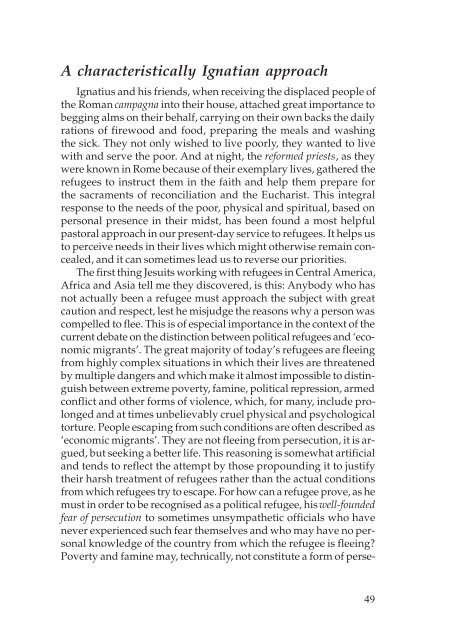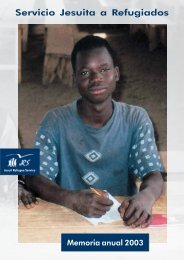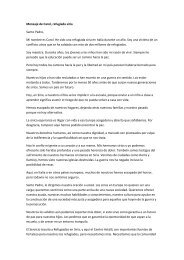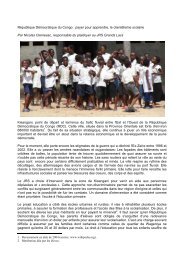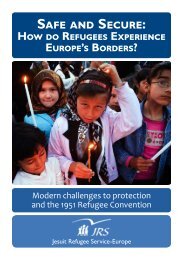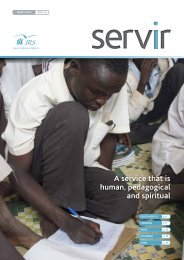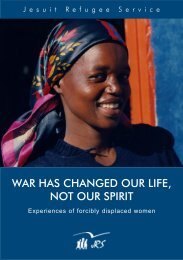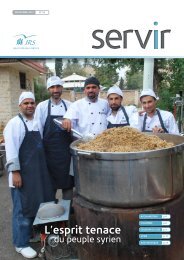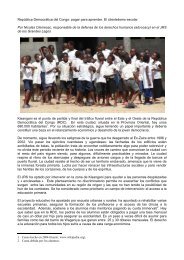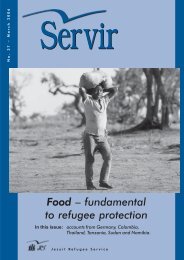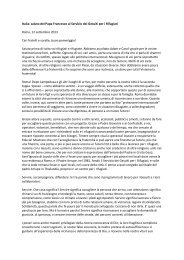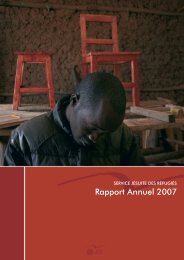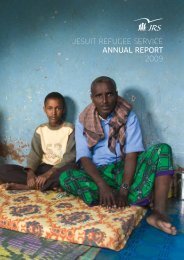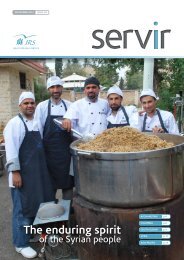EVERYBODY'S CHALLENGE - Jesuit Refugee Service | USA
EVERYBODY'S CHALLENGE - Jesuit Refugee Service | USA
EVERYBODY'S CHALLENGE - Jesuit Refugee Service | USA
Create successful ePaper yourself
Turn your PDF publications into a flip-book with our unique Google optimized e-Paper software.
A characteristically Ignatian approach<br />
Ignatius and his friends, when receiving the displaced people of<br />
the Roman campagna into their house, attached great importance to<br />
begging alms on their behalf, carrying on their own backs the daily<br />
rations of firewood and food, preparing the meals and washing<br />
the sick. They not only wished to live poorly, they wanted to live<br />
with and serve the poor. And at night, the reformed priests, as they<br />
were known in Rome because of their exemplary lives, gathered the<br />
refugees to instruct them in the faith and help them prepare for<br />
the sacraments of reconciliation and the Eucharist. This integral<br />
response to the needs of the poor, physical and spiritual, based on<br />
personal presence in their midst, has been found a most helpful<br />
pastoral approach in our present-day service to refugees. It helps us<br />
to perceive needs in their lives which might otherwise remain concealed,<br />
and it can sometimes lead us to reverse our priorities.<br />
The first thing <strong>Jesuit</strong>s working with refugees in Central America,<br />
Africa and Asia tell me they discovered, is this: Anybody who has<br />
not actually been a refugee must approach the subject with great<br />
caution and respect, lest he misjudge the reasons why a person was<br />
compelled to flee. This is of especial importance in the context of the<br />
current debate on the distinction between political refugees and ‘economic<br />
migrants’. The great majority of today’s refugees are fleeing<br />
from highly complex situations in which their lives are threatened<br />
by multiple dangers and which make it almost impossible to distinguish<br />
between extreme poverty, famine, political repression, armed<br />
conflict and other forms of violence, which, for many, include prolonged<br />
and at times unbelievably cruel physical and psychological<br />
torture. People escaping from such conditions are often described as<br />
‘economic migrants’. They are not fleeing from persecution, it is argued,<br />
but seeking a better life. This reasoning is somewhat artificial<br />
and tends to reflect the attempt by those propounding it to justify<br />
their harsh treatment of refugees rather than the actual conditions<br />
from which refugees try to escape. For how can a refugee prove, as he<br />
must in order to be recognised as a political refugee, his well-founded<br />
fear of persecution to sometimes unsympathetic officials who have<br />
never experienced such fear themselves and who may have no personal<br />
knowledge of the country from which the refugee is fleeing?<br />
Poverty and famine may, technically, not constitute a form of perse-<br />
49


